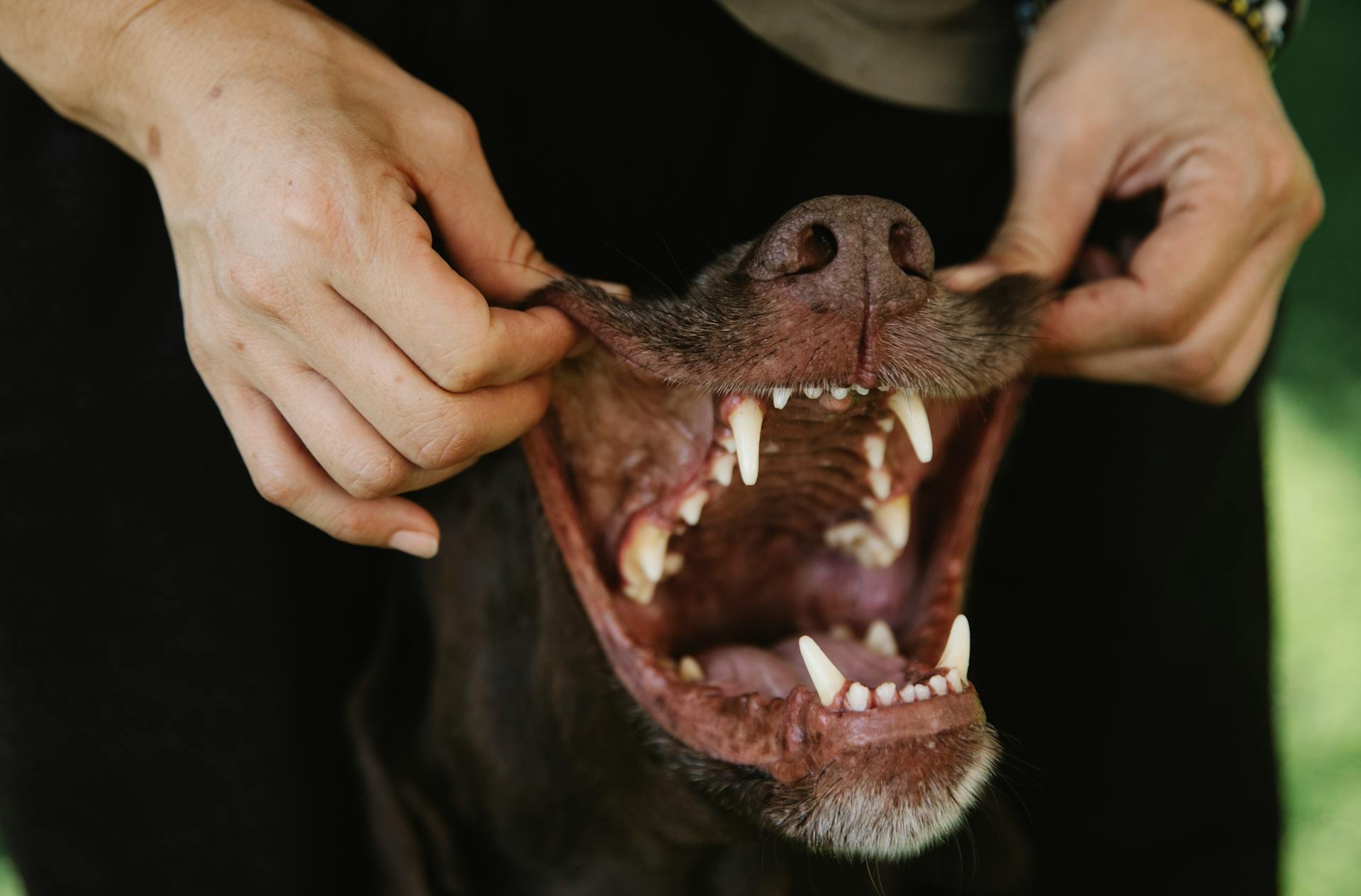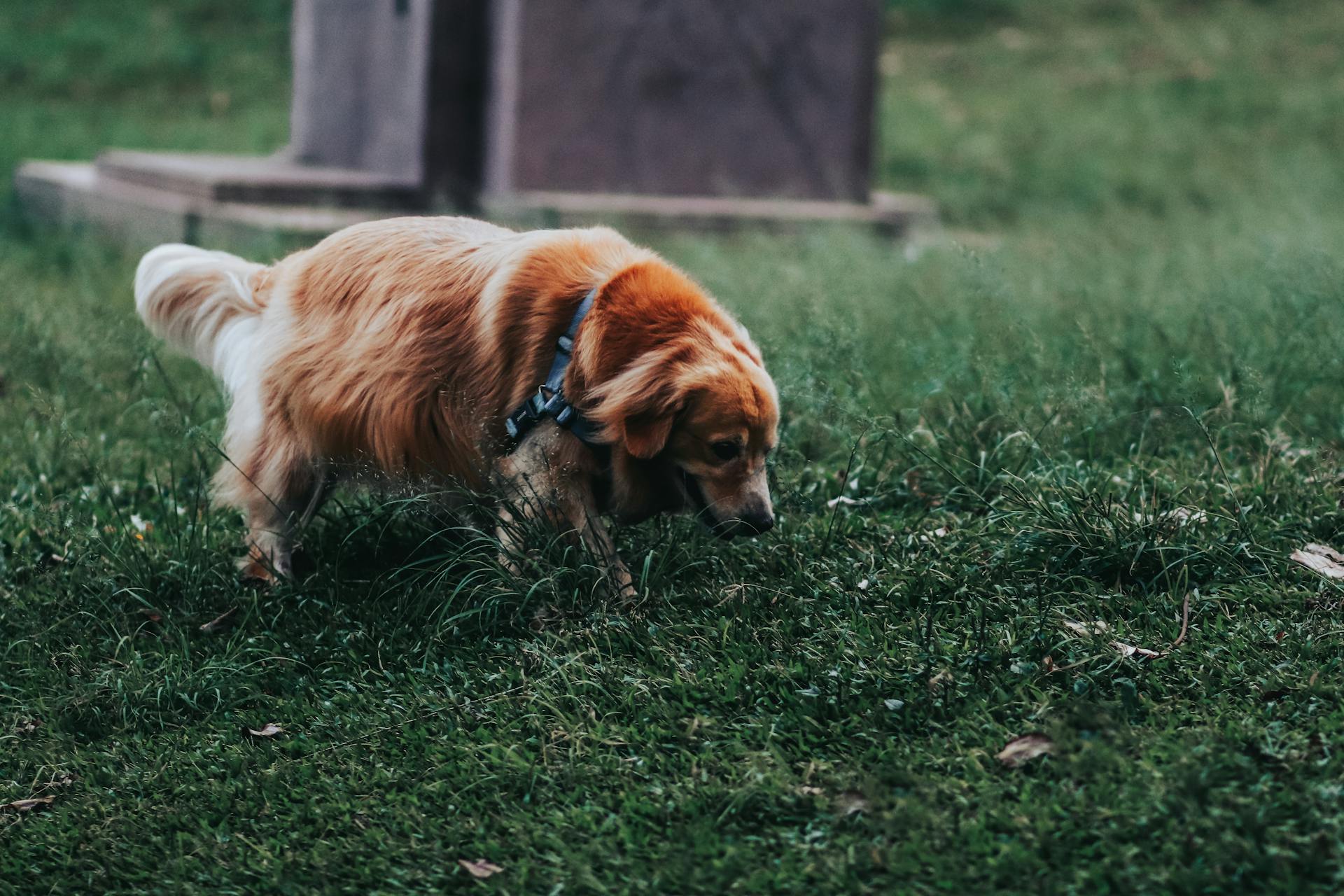
Dogs from puppy mills often exhibit fear-based behaviors due to the inhumane conditions they were raised in.
These dogs may be wary of strangers and take time to warm up to new people.
Some common issues include anxiety, aggression, and fear of loud noises.
Puppy mill dogs may also struggle with separation anxiety, leading to destructive behavior when left alone.
With patience, love, and proper training, many puppy mill dogs can overcome these issues and become loving companions.
Curious to learn more? Check out: Puppy Mill Mom Dogs
Behavioral Concerns
Dogs from puppy mills can have a range of behavioral concerns that are shaped by their early life experiences.
Their new world can be overwhelming, and they may not immediately feel safe, making training and adjustment to a new home even more challenging.
Studies have shown that dogs from puppy mills are more likely to develop extreme fear, phobias, and compulsive behaviors.
They may have a harder time learning to use a designated potty area, as they're often raised in small and unsanitary cages where they soil where they sleep and eat.
On a similar theme: Dogs Reaction to New Puppy
Dogs from puppy mills may also have difficulty with human-directed aggression, which can be a result of a lack of regular human socialization.
Their early life experiences can shape their lifelong behavior, making training and behavior modification a lifelong commitment for some adult dogs.
Their lack of exposure to various environments and experiences can cause them to be easily overwhelmed and shut down in new situations, making everyday activities like walking on grass or visiting the groomer or veterinarian a challenge.
Discover more: Caesar Millan Better Human Better Dog
Health Concerns
Dogs from puppy mills can suffer from a range of health issues due to inadequate veterinary care.
Sick or injured dogs are often left to suffer endlessly or die because they're not seen by a veterinarian.
Puppy mills don't perform genetic or health testing on dogs they breed, which can result in genetically-based conditions like hip or elbow dysplasia.
Dogs from puppy mills are also prone to heart defects, eye defects, cryptorchism, or demodicosis, which can be passed down from generation to generation.
The breeding females are often undernourished and receive little medical care, leading to stress on their bodies from repeated breeding.
Puppies from puppy mills are usually prematurely weaned from their mothers, causing emotional trauma to both the mother dog and the puppies.
Dogs from puppy mills may have a higher risk of developing lifelong health issues due to poor nutrition and inadequate care.
Suggestion: House Training an Ex Breeding Dog
6 Common Issues
Dogs from puppy mills can exhibit a range of behavioral issues due to their inadequate socialization and living conditions.
They often become fearful or aggressive around people and other animals, which can be a result of being kept in small cages with little to no human interaction.
Dogs from puppy mills may also develop separation anxiety due to being constantly separated from their mothers and littermates at a young age.
They can become destructive and chew on furniture or other household items, which is a common symptom of anxiety and stress.
On a similar theme: The Year of the Puppy How Dogs Become Themselves
Puppy mill dogs may also exhibit fear-based behaviors such as hiding or cowering, which can be a result of their traumatic experiences.
These behavioral issues can be challenging to address, but with patience, love, and proper training, many puppy mill dogs can overcome their past traumas and become loving and well-adjusted pets.
A fresh viewpoint: Puppy Mill Dogs
Puppy Mills: The Problem
Puppy mills are not only bad for the breeding dogs and puppies born and raised there, but they also damage the entire dog population.
The conditions the dogs live in severely affect long-term health and behavior.
Inadequate healthcare and lack of attention to genetic problems are just a few of the issues that arise in puppy mills.
Unsuspecting puppy buyers can be taken by surprise shortly after getting their new puppy or even years down the road when they are diagnosed with a medical condition.
Even if the puppy grows into a healthy dog, the parents of the dog are made to suffer for years.
Housebreaking and Training
Housebreaking and Training can be a challenge with dogs from puppy mills. They often have a higher likelihood of developing house soiling behavior due to their early life experiences in unsanitary conditions.
Dogs from puppy mills may have a smaller bladder capacity and less control over their bowel movements, making accidents more common. They may also be more prone to anxiety and stress, which can exacerbate the issue.
Consistency and patience are key when housebreaking a dog from a puppy mill. Establishing a routine and rewarding good behavior can help them learn faster.
Recommended read: Housebreaking
Dog Training: Anxiety
Many dogs, especially those from puppy mill scenarios, are anxious and fearful due to their early life experiences. They've been raised in small cages with minimal human interaction and socialization.
Dogs from puppy mills are often taken from their mothers and siblings as early as 5 weeks old, which is far too young for them to be separated. This can lead to anxiety and fearfulness in later life.
Puppy mill dogs have been bred for profit, not for companionship, and are often abandoned once they're no longer useful. This can make them more sensitive to stress and anxiety.
It's essential to approach training with empathy, understanding that these dogs have been through a lot. They still make wonderful pets, but they need patience, love, and gentle guidance.
Older breeding dogs from puppy mills have spent most of their lives in cages, isolated from human interaction aside from meals being thrown into their cages. This lack of socialization can make them more challenging to train.
Both my late Orion and my current dog Arwen are puppy mill survivors, and they've taught me that these dogs are just as loving and fun as any other dog.
Discover more: Dogs Rescued from Puppy Mill
Housebreaking an Adult Dog
Housebreaking an adult dog can be a challenging task, but with patience and consistency, it's achievable. The first step is to establish a routine, which is essential for housebreaking.
Adult dogs can hold their bladder for about 6-8 hours, but this can vary depending on the individual dog and its breed. Consistency is key when creating a routine.
Dogs thrive on predictability, so it's essential to take them out to pee and poop at the same time every day. A consistent schedule helps them learn when it's time to go.
Some adult dogs may require more frequent trips outside due to their age or health conditions. For example, older dogs may need to go out more often.
Positive reinforcement is a powerful tool in housebreaking an adult dog. Rewarding good behavior with treats and praise encourages them to repeat the desired actions.
It's crucial to watch for signs that your dog needs to go, such as sniffing or circling. If you catch them in the act, calmly take them outside to complete their business.
Housebreaking an adult dog requires a clean slate, so it's essential to start fresh and not rely on previous training. This means ignoring any existing habits and focusing on creating new ones.
A different take: Why Are Dachshunds so Stubborn
Sources
- https://www.darwindogs.org/post/training-a-scared-dog
- https://cheriwulfflucas.com/housebreaking-an-adult-dog-from-a-puppy-mill/
- https://www.rover-time.com/six-common-issues-puppy-mill-dogs/
- https://andreaarden.com/dog-facts-and-trivia/puppy-mill-puppies/
- https://www.zoetispetcare.com/blog/article/how-identify-puppy-mill
Featured Images: pexels.com


